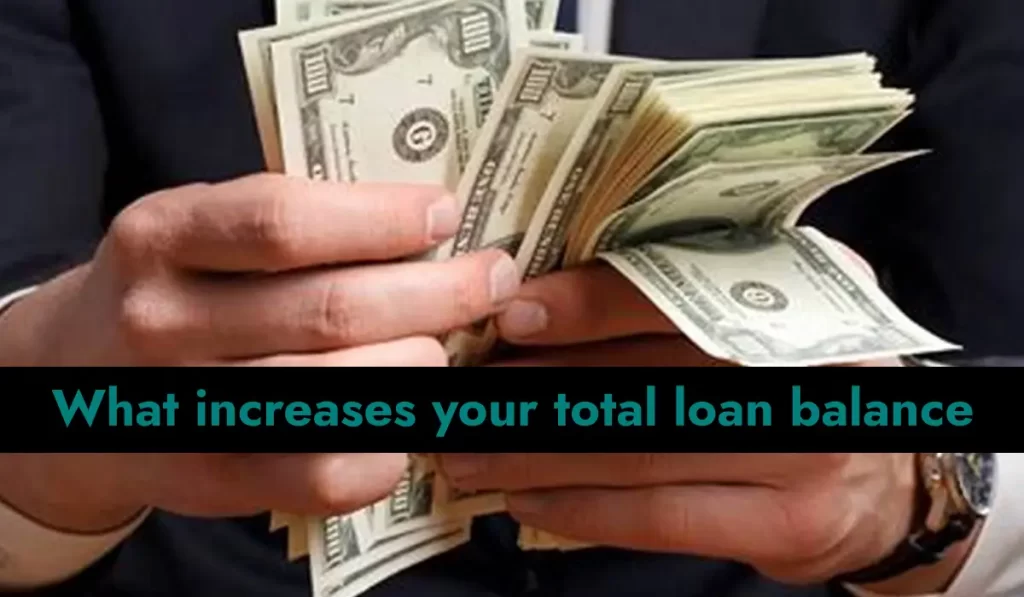Understanding what increases your total loan balance is crucial, but it’s also empowering. It puts you in control of your finances. Your total loan balance is the money you owe on a loan, including the principal and any accrued interest.
Several factors can cause this balance to grow over time, sometimes without you even realizing it. This article will explore the key reasons your loan balance might increase and offer tips on controlling it.
Related: How to Get Approved for a Business Loan? Step-by-step Guide
Reasons that increase your total loan balance
Reason 1. Interest Accumulation
Interest Accumulation: When you borrow money, the lender charges you Interest, a percentage of the loan amount. This Interest is added to your balance over time. It’s a subtle but significant factor that can cause your loan balance to grow. For example, if you have a $10,000 loan with a 5% annual interest rate, you’ll owe $500 in Interest each year if you only pay the minimum amount.
Compounding Interest: If your loan has a compound Interest, the Interest itself can start earning Interest, which can cause your loan balance to grow faster. This is common with credit cards and some types of loans.
Reason 2. Missed or Late Payments
Penalty Fees: Lenders often charge penalty fees if you miss a payment or make a late payment. These fees are added to your loan balance, increasing the total amount you owe. Making timely payments is not just a responsibility, it’s a commitment to managing your loans effectively.
Interest on Missed Payments: In addition to penalty fees, missed payments can add more Interest to your balance. The longer you delay paying, the more interest accrues, making it harder to catch up.
Reason 3. Loan Terms and Conditions
Extended Repayment Periods: Some loans offer extended repayment periods, which may lower your monthly payment but can increase the total amount of Interest you pay over time, leading to a higher total loan balance.
Adjustable Interest Rates: Loans with adjustable interest rates can see their rates increase over time, which means higher interest charges and a growing loan balance.
Reason 4. Capitalized Interest
What is Capitalized Interest? Capitalized Interest occurs when unpaid Interest is added to your principal balance. This can happen with student loans or other types of loans if you don’t pay Interest as it accrues. For example, if you have a student loan with $1,000 in unpaid Interest, that amount might be added to your principal, increasing the total loan balance.
How to Avoid It: Making interest payments while you’re still in school or during deferment periods can help prevent interest capitalization.
Reason 5. Forbearance and Deferment
Temporary Relief with Long-Term Costs: Forbearance and deferment allows you to temporarily pause your loan payments, which can be helpful in times of financial difficulty. However, Interest often continues to accrue during these periods, and it may be added to your loan balance when the forbearance or deferment ends, increasing the total amount you owe.
Making Payments During Forbearance: To avoid a significant increase in your loan balance, try to make at least interest payments during forbearance or deferment periods.

Reason 6. Loan Refinancing
Refinancing Impact: Refinancing a loan sometimes can become something what increases your total loan balance if you extend the repayment period or if fees are added to the loan. While refinancing can lower your monthly payment, it may result in paying more in Interest over the life of the loan.
Weighing the Pros and Cons: Before refinancing, consider whether the short-term benefits are worth the potential long-term increase in your loan balance.
Reason 7. Changes in Loan Terms
Modifying Your Loan Agreement: If you change the terms of your loan, such as by extending the repayment period or consolidating multiple loans, your total balance can increase. This is because you may end up paying more Interest over time, even if your monthly payments are lower.
Reason 8. Credit Card Debt
High Interest Rates: Credit card loans often have high interest rates, and if you only make minimum payments, your balance can grow rapidly due to accumulating Interest.
Balance Transfers: Transferring balances to a new credit card with a lower interest rate is a good idea, but if the promotional rate expires or you continue accumulating debt, your total balance can increase.
Reason 9. Additional Borrowing
Taking Out More Loans: If you take out additional loans or increase your credit limit, your total loan balance will naturally increase. This includes using a home equity line of credit (HELOC) or taking out personal loans.
Consolidation Loans: While consolidating loans can simplify your payments, they can also lead to a higher total balance if the new loan has a more extended repayment period or higher interest rate.
Reason 10. Debt Accumulation Over Time
Snowball Effect: When you have multiple debts, your total loan balance can easily grow over time, especially if you’re not paying down the principal aggressively. Interest charges, fees, and penalties can add up, making it harder to get out of debt.
Paying Off Debts Strategically: Focus on paying off high-interest debts first, or consider using the debt snowball method, which involves paying off smaller debts first to gain momentum.
Reason 11. Inflation
How Inflation Affects Debt: Inflation can indirectly increase your loan balance by reducing the purchasing power of your money. This means that while the nominal amount of your debt stays the same, the real value of what you owe increases over time.
Reason 12. Economic Conditions
Impact of Recession: During economic downturns, interest rates may rise, or your income may decrease, making it more challenging to manage loan payments. This can increase your total loan balance due to missed payments or the need to borrow more.
Government Policies: Changes in government policies, such as tax laws or lending regulations, can also affect your loan balance. For example, changes in tax-deductible Interest might increase your out-of-pocket costs.
Reason 13. Unexpected Life Events
Medical Emergencies: Unexpected medical bills or other emergencies can force you to pay additional debt, increasing your total loan balance.
Job Loss: Losing your job or a significant source of income can make it challenging to keep up with loan payments, leading to missed payments, increased Interest, and a growing balance.
Understanding what increases your total loan balance is critical to managing your debt effectively. By being aware of these factors and taking proactive steps to minimize their impact, you can keep your loan balance under control and avoid the stress of unmanageable debt. Regularly reviewing your loan terms, making timely payments, and seeking advice when needed can help you stay on top of your finances.
By following these strategies, you can ensure that you’re on the right path to financial stability and avoid the pitfalls that lead to a growing loan balance. Remember, you play a crucial role in managing your loan balance effectively.
Related: What is Annual Revenue? Why does it matter for Business growth?






